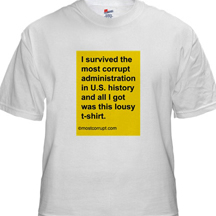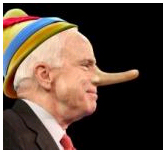| “I’m John McCain and I approve this lie”
Going by the campaign TV ads approved by
John McCain, you’d think that his opponent is responsible for high gas
prices, will raise your taxes, associates with terrorists, wants sex
education taught to kindergartners, and called Sarah Palin a pig.
(Nonpartisan web sites FactCheck.org and Politifact.com examine the
truthfulness of ads from both campaigns.)
The whoppers aren’t confined to McCain's
advertising. The candidate continues to make misleading statements in
interviews and at campaign rallies.
Iraq
John McCain testily told Time
Magazine in August that “Iraq is a peaceful and stable country.”¹
Jurisprudence
At the Saddleback Church forum on August
16, Pastor Rick Warren asked John McCain, “Which existing Supreme Court
justices would you not have nominated?”
“With all due respect," he answered,
"Justice Ginsburg, Justice Breyer, Justice Souter and Justice Stevens.”
(But Senator McCain actually voted to confirm Ginsburg, Breyer and Souter.
He wasn't a senator when Stevens was nominated.)
A Little White Lie Heard
Round the World
McCain Stands Up
Letterman
Los Angeles Times, Matea Gold,
September 25, 2008
Looks like the long-friendly relationship
between John McCain and David Letterman is on the skids. The late-night
comedian was none too pleased that the Republican presidential nominee
bailed on an appearance Wednesday on the “Late Show” so he could return
to Washington to deal with the economic crisis, particularly because he
found time to give an interview to CBS News anchor Katie Couric along
the way.
McCain was supposed to make his 13th
appearance on Letterman’s show, but he backed out late Wednesday
afternoon, saying he was suspending campaign activities to focus on
getting a financial bailout plan through Congress.
During the taping of the show, Letterman
told the audience that McCain had called him personally to apologize for
standing him up and said he was rushing to the airport.
“I’m more than a little disappointed by
this behavior,” Letterman said. “We’re suspending the campaign.
Suspending it because there’s an economic crisis, or because the poll
numbers are sliding?”
The audience applauded.
“You don’t suspend your campaign,” he
added. “Do you suspend your campaign? No, because that makes me think,
well, you know, maybe there will be others things down the road—if he’s
in the White House, he might just suspend being president. I mean, we’ve
got a guy like that now!”
Then in the midst of interviewing MSNBC’s
Keith Olbermann, Letterman learned that the GOP candidate was about five
blocks away at CBS News headquarters, preparing for an interview with
Couric.
Incredulous, Letterman interrupted his
chat with Olbermann to show the audience a live shot on the internal CBS
news feed of McCain getting touched up by a makeup artist as he waited
to talk to Couric.
“He doesn’t seem to be racing to
the airport, does he?” Letterman said, shouting at the television
monitor: “Hey John, I got a question! You need a ride to the airport?”²
Why Sarah Palin for
Veep?
Sarah Palin had served as the mayor of a
town of 5,000 people and for 21 months as the Governor of Alaska when John
McCain picked her to be his running mate. CBS 60 Minutes’ Scott Pelley
noted, “The criticism of Governor Palin is that she was a brilliant
marketing choice for the campaign, but she’s not well versed on the
economy or foreign affairs….Is it true you only met her a couple of times
before you selected her?”
“I’d only known her a few times but a
couple of times,” McCain said. “But I had watched her very carefully. I
had followed her career.”
“How’d you make that decision?”
“Well, I based it on what’s the best for
the country. I looked at her record. I looked at her.”
Too many
regulators?
John McCain told a Tampa rally on
September 16: “Too many firms on Wall Street have been able to count on
casual oversight. And there are so many of these regulators that the
responsibility for oversight is scattered, unfocused and
ineffective."³
The assertion of an overabundance of
regulators is pure fantasy, and John McCain knows it, since few people
were more involved in diminishing regulatory agencies’ budgets and power
than he and fellow Senator Phil Gramm (who was McCain’s official economic
advisor until his recent “nation of whiners” remarks. The two have been
close for years; McCain chaired Gramm’s short-lived presidential campaign
in 1996.) As reported in Mother Jones:
In the 1990’s, as chairman of the Senate
banking committee, Phil Gramm routinely turned down Securities and
Exchange Commission chairman Arthur Levitt’s requests for more money to
police Wall Street; during this period, the SEC’s workload shot up 80
percent, but its staff grew only 20 percent. Gramm also opposed an SEC
rule that would have prohibited accounting firms from getting too close
to the companies they audited—at one point, according to Levitt’s
memoir, he warned the SEC chairman that if the commission adopted the
rule, its funding would be cut. And in 1999, Gramm pushed through a
historic banking deregulation bill that decimated Depression-era
firewalls between commercial banks, investment banks, insurance
companies, and securities firms—setting off a wave of merger mania.
But Gramm’s most cunning coup on behalf
of his friends in the financial services industry—friends who gave him
millions over his 24-year congressional career—came on December 15,
2000….As Congress and the White House were hurriedly hammering out a
$384-billion omnibus spending bill, Gramm slipped in a 262-page measure
called the Commodity Futures Modernization Act…written with the help of
financial industry lobbyists.
The act, he declared, would ensure that
neither the SEC nor the Commodity Futures Trading Commission (CFTC) got
into the business of regulating newfangled financial products called
swaps—and would thus “protect financial institutions from
overregulation” and “position our financial services industries to be
world leaders into the new century.”
It didn’t quite work out that way. For
starters, the legislation contained a provision—lobbied for by Enron, a
generous contributor to Gramm—that exempted energy trading from
regulatory oversight, allowing Enron to run rampant, wreck the
California electricity market, and cost consumers billions before it
collapsed. (For Gramm, Enron was a family affair. Eight years earlier,
his wife, Wendy Gramm, as CFTC chairwoman, had pushed through a rule
excluding Enron’s energy futures contracts from government oversight.
Wendy later joined the Houston-based company’s board, and in the
following years her Enron salary and stock income brought between
$915,000 and $1.8 million into the Gramm household.)
But the Enron loophole was small
potatoes compared to the devastation that unregulated swaps would
unleash. Credit default swaps are essentially insurance policies
covering the losses on securities in the event of a default. Financial
institutions buy them to protect themselves if an investment they hold
goes south. It’s like bookies trading bets, with banks and hedge funds
gambling on whether an investment (say, a pile of sub prime mortgages
bundled into a security) will succeed or fail. Because of the
swap-related provisions of Gramm’s bill—which were supported by Fed
chairman Alan Greenspan and Treasury secretary Larry Summers—a $62
trillion market (nearly four times the size of the entire US stock
market) remained utterly unregulated, meaning no one made sure the banks
and hedge funds had the assets to cover the losses they
guaranteed.4
McCain’s assertion that there are “so
many regulators” is equally absurd when applied to the oversight agency
for Fannie Mae and Freddie Mac, the Office of Federal Housing Enterprise
Oversight. The Wall Street Journal reported, “James B. Lockhart III has
spent the past two years telling almost anyone who would listen that the
obscure federal agency he heads needed more power to do its
job.”5
Cold Shoulder on
Warming
McCain Leaves Rivals
Out
Los Angeles Times, Maeve
Reston, May 15, 2008
As he rolled out his plan to combat
global warming this week, Republican John McCain jumped at the
opportunity to remind voters that he’d flown nearly to the ends of the
earth to view the effects of global warming. But apparently he wasn’t
willing to give that same credit to his Democratic rivals.
When a reporter in North Bend, Wash.,
asked McCain why the average voter concerned with climate change should
support him over Hillary Rodham Clinton or Barack Obama, his reply was
tart. “I have been involved in this issue for many, many years,’ the
Arizona senator said. “They have never, to my knowledge, been involved
in legislation, nor hearings, nor engagement in this issue,” he said,
adding that he’d “traveled around the world and seen the impacts of
climate change.”
What he didn’t mention was that on two of
those trips, Clinton was there alongside him. She joined him on a 2004
congressional delegation to Svalbard, a group of Norwegian islands in
the Arctic, and on a 2005 trek to Alaska and Canada’s Yukon Territory,
where they viewed shrinking glaciers. McCain mentioned both trips in his
speech but not the New York senator.
And McCain enjoyed the support of
his Democratic rivals in the Senate chambers too. Clinton and Obama
co-sponsored global warming legislation proposed by McCain and
Sen. Joe Lieberman of Connecticut.6
Robert C. Keating, Editor
October 14, 2008
©
2008 MostCorrupt.com
Contact us
________________________________________________________________
¹ Time Magazine,
interview with Michael Carney and James Scherer, August 27, 2008
² Los
Angeles Times, Matea Gold, September 25, 2008
³ Los Angeles Times,
Michael Finnegan and Noam N. Levey, September 17, 2008
4 Mother Jones, David Corn, July/August,
2008
5 Wall Street Journal, James R. Hagerty
and Damian Paletta, July 25, 2008
6 Los
Angeles Times, Maeve Reston, May 15,
2008
_______________________________________________________________________
Who is the most corrupt president in U.S. history?

Most Corrupt Administration Souvenirs

home
| 
